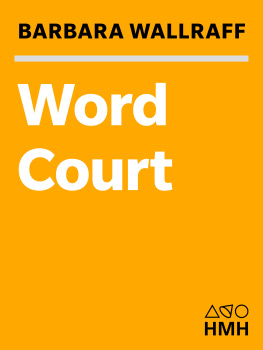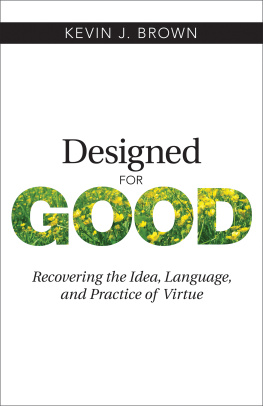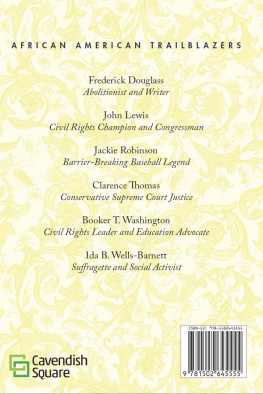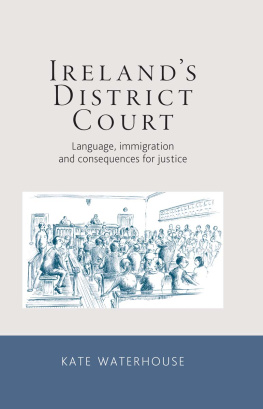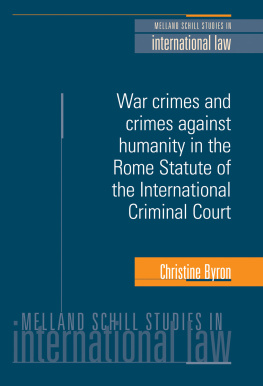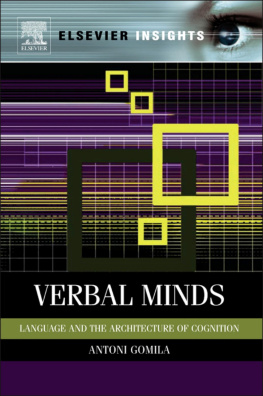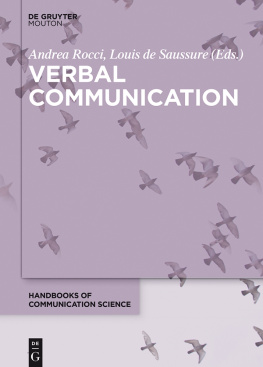Barbara Wallraff - Word Court: Wherein Verbal Virtue Is Rewarded, Crimes Against the Language Are Punished, and Poetic Justice Is Done
Here you can read online Barbara Wallraff - Word Court: Wherein Verbal Virtue Is Rewarded, Crimes Against the Language Are Punished, and Poetic Justice Is Done full text of the book (entire story) in english for free. Download pdf and epub, get meaning, cover and reviews about this ebook. year: 2012, publisher: Houghton Mifflin Harcourt, genre: Home and family. Description of the work, (preface) as well as reviews are available. Best literature library LitArk.com created for fans of good reading and offers a wide selection of genres:
Romance novel
Science fiction
Adventure
Detective
Science
History
Home and family
Prose
Art
Politics
Computer
Non-fiction
Religion
Business
Children
Humor
Choose a favorite category and find really read worthwhile books. Enjoy immersion in the world of imagination, feel the emotions of the characters or learn something new for yourself, make an fascinating discovery.
- Book:Word Court: Wherein Verbal Virtue Is Rewarded, Crimes Against the Language Are Punished, and Poetic Justice Is Done
- Author:
- Publisher:Houghton Mifflin Harcourt
- Genre:
- Year:2012
- Rating:4 / 5
- Favourites:Add to favourites
- Your mark:
- 80
- 1
- 2
- 3
- 4
- 5
Word Court: Wherein Verbal Virtue Is Rewarded, Crimes Against the Language Are Punished, and Poetic Justice Is Done: summary, description and annotation
We offer to read an annotation, description, summary or preface (depends on what the author of the book "Word Court: Wherein Verbal Virtue Is Rewarded, Crimes Against the Language Are Punished, and Poetic Justice Is Done" wrote himself). If you haven't found the necessary information about the book — write in the comments, we will try to find it.
Barbara Wallraff: author's other books
Who wrote Word Court: Wherein Verbal Virtue Is Rewarded, Crimes Against the Language Are Punished, and Poetic Justice Is Done? Find out the surname, the name of the author of the book and a list of all author's works by series.
Word Court: Wherein Verbal Virtue Is Rewarded, Crimes Against the Language Are Punished, and Poetic Justice Is Done — read online for free the complete book (whole text) full work
Below is the text of the book, divided by pages. System saving the place of the last page read, allows you to conveniently read the book "Word Court: Wherein Verbal Virtue Is Rewarded, Crimes Against the Language Are Punished, and Poetic Justice Is Done" online for free, without having to search again every time where you left off. Put a bookmark, and you can go to the page where you finished reading at any time.
Font size:
Interval:
Bookmark:
Copyright 2000 by Barbara Wallraff
Introduction copyright 2000 by Francine Prose
All rights reserved. No part of this publication may be reproduced or transmitted in any form or by any means, electronic or mechanical, including photocopy, recording, or any information storage and retrieval system, without permission in writing from the publisher.
For information about permission to reproduce selections from this book, write to or to Permissions, Houghton Mifflin Harcourt Publishing Company, 3 Park Avenue, 19th Floor, New York, New York 10016.
www.hmhco.com
The Library of Congress has cataloged the print edition as follows:
Wallraff, Barbara.
Word court: wherein verbal virtue is rewarded, crimes against the language are punished, and poetic justice is done/Barbara Wallraff.1st ed.
p. cm.
ISBN 978-0-1560-1118-1
ISBN 0-15-601118-2
1. English languageUsage. I. Title.
PE1460.W225 2000
428dc21 99-24678
e ISBN 978-0-544-10993-3
v4.1016
To all letter writers everywhere, and especially to the ones who have written nice letters to me
Sixteen years ago William Whitworth hired me to work for The Atlantic Monthly, and his willingness to take a chance on me then has led to just about every good thing thats ever happened to me professionally. Thank you, Bill. High up on the long list of those good things is this book, which happened because Andr Bernard was also willing to take a chance. Thank you, Andr.
Thanks go, as well, to my Atlantic colleagues, who cheered me on, wised me up, cut me slack, and helped me in so many other ways. Toby Lester and Wen Stephenson and their new-media posse were invaluable backup in the hunt for Word Fugitives, also known as Americas Most Wanted Words. Time and again Cullen Murphy, Allan Reeder, and Martha Spaulding earned my special gratitude and admiration for their vigilance, which allowed me to seem in the Word Court column, and so here, to be more sagacious than I am. Where I look foolish, of course, its no ones fault but my own.
In the able-assistance department, Jesse Wegman looms large. Here he is joined by an exaltation of interns whom I shrink from naming for fear of leaving a worthy one out.
Thanks to Professor Steven Pinker for helping me with my homework. Thanks to Lindy Hess no matter what. Thanks to the Oxford English Dictionary people who gave me the keys to their splendiferous online kingdom. Thanks to Clara Glaubman, Joel Hirsch, my favorite polymath Kermit Midthun, and Evelyn B. Wallraff for tryingand, Im happy to say, largely failingto find fault. Thanks to Eleanor Gould Packard, who in her gentle and solicitous finding of fault was an inspiration even more than a confederate. Thanks to Francine Prose for her estimable emceeing. Thanks to David Hough, Linda Lockowitz, Meredith Arthur, and all the other people at Harcourt who worked on this book, except the lawyers. Thanks to everyone who has shared a peeve, a tale, a suspicion, a surprise. Dont stop now!
And thanks, finally, to my darling Julian, for encouraging me to take chances and taking a chance on me, too.
Barbara Wallraffs Word Court is not only instructive and delightful but also immensely reassuring. Its very existence is a comfort to those of us who care about the language, to those of us who write and read and speak, and to those of us who entertain the inchoate, mystical, and probably indefensible notion that the principles of standard English are something like the Bill of Rights, or the Gregorian calendar, or even the law of gravitythe very foundations of order and harmony, the rules that guide our lives, the necessary structure without which the world we know would fly apart.
Whats so cheeringespecially to those of us who are sick of hearing ourselves complain that our students cant write, our children wont read, our colleagues cant spell, and no one has any interest in the proper way to use words or how to string sentences togetheris that in fact so many people are so interested that, month after month, readers address curious or perplexed or even enraged communications to Word Court, Barbara Wallraffs regular column in The Atlantic Monthly, the magazine where she has worked as an editor for many years. From all over the world, she writes, they send me letters, they send me e-mail, they send me voice mail, asking and telling and bragging and inveighing about how English is used and how it should be.
Its hard to conceive of a more competent or reliable judge, or one more qualified to resolve these matters of grammar and usage that so many people takeso surprisinglyto heart. And its equally difficult to imagine an approach, and a literary voice, less like that of our least favorite, most punitive eighth-grade teacherthat paradoxically soporific and terrifying scold with whom so many people seem to associate the whole concept of grammar. Barbara Wallraff believes in addressing these apparently touchy issues with humor and tact, two qualities very much in evidence throughout Word Court. Consequently, her book is not at all like the pronouncements of some stodgy or fussy wordwatcher but, rather, like the hilarious and helpful ministrations of Miss Manners, keeping a cool and sophisticated eye on the etiquette of language. MsGrammar@theatlantic.com (for that is Barbara Wallraffs much-visited e-mail address) is at once knowledgeable and flexible, intent on maintaining the clarity of our common language and alert to the promptings of precedent and consensus. At times her rare combination of expertise, patience, bemusement, and wit is oddly reminiscent of Click and Clack, NPRs Car Talk brothersin my view, two of the great educators in America.
Word Court is generous with practical and specific advice. Among its most useful suggestions is that we abandon our struggles with hideously awkward tangles of singular and plural, of pronoun agreement and shattered infinitives, and simply write around the problemsthat is, rewrite the sentence. And it addresses the complex questions that most often confront us when we sit down at the keyboard, or have a simple conversation. How ready should we be to embraceor how determined to rejectneologisms? (Its your choice when you will begin to accept recently adapted wordsand which ones. The verbs to gift, to impact, and to parent... are widely dislikedand who needs them? To fax and to Rollerblade are almost inevitable coinages, though, because the activities they describe are new, and new language must be found for them.) How do we cope with the fact that our language has so far failed to mirror our enlightened modern ideas about gender, thus forcing us to make many delicate daily decisions involving sex and the single pronoun and words such as freshman and chairman? (A speaker or writer who is trying simply to express an idea, rather than to pick a fight with listeners or readers, needs to tread carefully.... Freshperson is obviously impossiblebut chairperson seems harmless enough.) What are the benign and the improper uses of jargon? What about participles and gerunds, pronoun antecedents, parallel series? And how far must we go to avoid ending a sentence with a preposition? (Not far at all, it seems.)
Ive said that Word Court is delightful and informative, but I should also add a slight caveat: its humbling, as well. My sense of my own superiority and invulnerability in matters of grammar was dismantled, bit by bit, as I read along.
One of the books most beneficial chapters, A Grammarians Dozen, considers, in order of ascending importance, thirteen specific grammatical issues that arent well mapped in many peoples heads and are therefore widely misunderstood. By the time the dozen reached its double crescendo, Case of personal pronouns followed shortly by Possessives, I had learned the answers to all sorts of questions that somewhere along the line I had lost the courage to ask. For example: What exactly are restrictive and nonrestrictive clauses, and how does the comma figure into all this? Foolishly, I had come to think that it was too late for me to admit that I didnt know the rule, and so was operating on instinct rather than knowledgein other words, faking italways hoping that some saintly, attentive copy editor would save me from my own mistakes.
Next pageFont size:
Interval:
Bookmark:
Similar books «Word Court: Wherein Verbal Virtue Is Rewarded, Crimes Against the Language Are Punished, and Poetic Justice Is Done»
Look at similar books to Word Court: Wherein Verbal Virtue Is Rewarded, Crimes Against the Language Are Punished, and Poetic Justice Is Done. We have selected literature similar in name and meaning in the hope of providing readers with more options to find new, interesting, not yet read works.
Discussion, reviews of the book Word Court: Wherein Verbal Virtue Is Rewarded, Crimes Against the Language Are Punished, and Poetic Justice Is Done and just readers' own opinions. Leave your comments, write what you think about the work, its meaning or the main characters. Specify what exactly you liked and what you didn't like, and why you think so.

